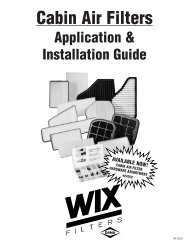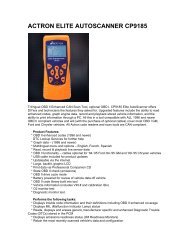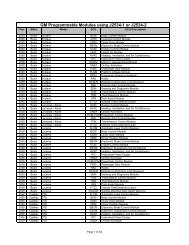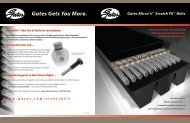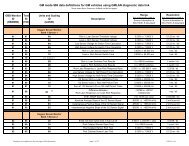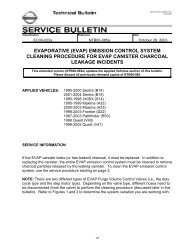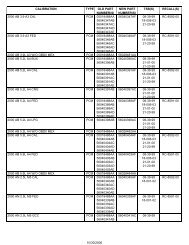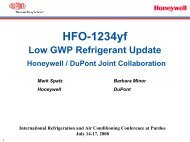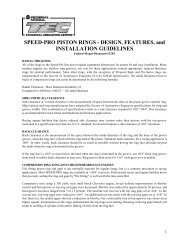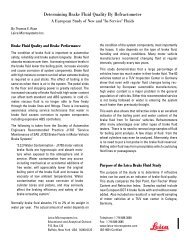MOTOR OIL GUIDE - AA1Car
MOTOR OIL GUIDE - AA1Car
MOTOR OIL GUIDE - AA1Car
You also want an ePaper? Increase the reach of your titles
YUMPU automatically turns print PDFs into web optimized ePapers that Google loves.
AMERICAN<br />
PETROLEUM<br />
INSTITUTE<br />
Which oil is right for you?<br />
The current and previous API Service Categories are listed below.<br />
Vehicle owners should refer to their owner’s manuals before<br />
consulting these charts. Oils may have more than one performance<br />
level.<br />
For automotive gasoline engines, the latest engine oil service<br />
category includes the performance properties of each earlier<br />
category. If an automotive owner’s manual calls for an API SJ<br />
or SL oil, an API SM oil will provide full protection. For diesel<br />
engines, the latest category usually – but not always – includes<br />
the performance properties of an earlier category.<br />
Gasoline Engines<br />
Category Status Service<br />
SM<br />
SL<br />
Current<br />
SJ Current<br />
SH Obsolete<br />
SG<br />
SF<br />
SE<br />
Obsolete<br />
Obsolete<br />
Obsolete<br />
SD Obsolete<br />
SC<br />
Obsolete<br />
SB Obsolete<br />
SA Obsolete<br />
<strong>MOTOR</strong> <strong>OIL</strong> <strong>GUIDE</strong><br />
Current<br />
For all automotive engines currently<br />
in use. Introduced November 30, 2004,<br />
SM oils are designed to provide improved<br />
oxidation resistance, improved deposit<br />
protection, better wear protection, and<br />
better low-temperature performance over<br />
the life of the oil. Some SM oils may also<br />
meet the latest ILSAC specification<br />
and/or qualify as Energy Conserving.<br />
For 2004 and older automotive engines.<br />
For 2001 and older automotive engines.<br />
For 1996 and older engines. Valid when<br />
preceded by current C categories.<br />
For 1993 and older engines.<br />
For 1988 and older engines.<br />
CAUTION—Not suitable for use in<br />
gasoline-powered automotive engines<br />
built after 1979.<br />
CAUTION—Not suitable for use in<br />
gasoline-powered automotive engines<br />
built after 1971. Use in more modern<br />
engines may cause unsatisfactory<br />
performance or equipment harm.<br />
CAUTION—Not suitable for use in<br />
gasoline-powered automotive engines<br />
built after 1967. Use in more modern<br />
engines may cause unsatisfactory<br />
performance or equipment harm.<br />
CAUTION—Not suitable for use in<br />
gasoline-powered automotive engines<br />
built after 1963. Use in more modern<br />
engines may cause unsatisfactory<br />
performance or equipment harm.<br />
CAUTION—Contains no additives. Not<br />
suitable for use in gasoline-powered<br />
automotive engines built after 1930.<br />
Use in modern engines may cause<br />
unsatisfactory engine performance<br />
or equipment harm.<br />
Note: API intentionally omitted “SI” and “SK” from the sequence of<br />
categories. For more information about API’s Engine Oil Program, visit<br />
our website at www.api.org/eolcs.<br />
Diesel Engines<br />
Category Status Service<br />
Introduced in 2002. For high-speed, four-stroke<br />
engines designed to meet 2004 exhaust<br />
emission standards implemented in 2002. CI-4<br />
oils are formulated to sustain engine durability<br />
CI-4 Current<br />
where exhaust gas recirculation (EGR) is used<br />
and are intended for use with diesel fuels<br />
ranging in sulfur content up to 0.5% weight.<br />
Can be used in place of CD, CE, CF-4, CG-4,<br />
and CH-4 oils. Some CI-4 oils may also qualify<br />
for the CI-4 PLUS designation.<br />
CH-4 Current<br />
CG-4<br />
CF-4<br />
CF-2<br />
CF<br />
CE Obsolete<br />
CD-II Obsolete<br />
CD<br />
CC<br />
CB<br />
CA<br />
Current<br />
Current<br />
Current<br />
Current<br />
Obsolete<br />
Obsolete<br />
Obsolete<br />
Obsolete<br />
Introduced in 1998. For high-speed, four-stroke<br />
engines designed to meet 1998 exhaust<br />
emission standards. CH-4 oils are specifically<br />
compounded for use with diesel fuels ranging<br />
in sulfur content up to 0.5% weight. Can be<br />
used in place of CD, CE, CF-4, and CG-4 oils.<br />
Introduced in 1995. For severe duty, high-speed,<br />
four-stroke engines using fuel with less than<br />
0.5% weight sulfur. CG-4 oils are required for<br />
engines meeting 1994 emission standards.<br />
Can be used in place of CD, CE, and CF-4 oils.<br />
Introduced in 1990. For high-speed, four-stroke,<br />
naturally aspirated and turbocharged engines.<br />
Can be used in place of CD and CE oils.<br />
Introduced in 1994. For severe duty, two-strokecycle<br />
engines. Can be used in place of CD-II<br />
oils.<br />
Introduced in 1994. For off-road, indirectinjected<br />
and other diesel engines including<br />
those using fuel with over 0.5% weight sulfur.<br />
Can be used in place of CD oils.<br />
Introduced in 1985. For high-speed, four-stroke,<br />
naturally aspirated and turbocharged engines.<br />
Can be used in place of CC and CD oils.<br />
Introduced in 1985. For two-stroke cycle<br />
engines.<br />
Introduced in 1955. For certain naturally<br />
aspirated and turbocharged engines.<br />
CAUTION—Not suitable for use in diesel-powered<br />
engines built after 1990.<br />
CAUTION—Not suitable for use in diesel-powered<br />
engines built after 1961.<br />
CAUTION—Not suitable for use in diesel-powered<br />
engines built after 1959.<br />
Copyright 2004 - American Petroleum Institute. All rights reserved.<br />
API, the API logo, the API Service Symbol (Donut), the API Service<br />
Symbol with CI-4 PLUS logo and the API Certification Mark (Starburst)<br />
are either trademarks or registered trademarks of the American<br />
Petroleum Institute in the United States and/or other countries.<br />
Printed in U.S.A. Creative Services | 24137 | 09.04 | Product No. F1551MO



